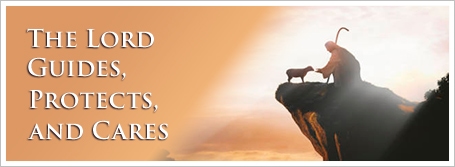As our heavenly Father, God wants to be intimately involved in our lives to guide, protect, and care for us because we belong to Him. There are several names and titles for God in the Bible, and they all indicate various characteristics of God. The more we can learn about His characteristics, the more we can believe to see how God works abundantly in our lives. One title of God is Jehovah-roi, the Lord our Shepherd.
God compares Himself to a shepherd to impress on us how much He cares for us.
Psalm 23:1:
The Lord is my shepherd; I shall not want.
The phrase “The Lord is my shepherd” is translated from the Hebrew words Jehovah and roi. Jehovah is a name for God that emphasizes His relationship to that which He has created. As Jehovah, God wants to be intimately involved with the lives of His people. The Hebrew word roi, which is translated “my shepherd,” is a form of the word raah. Raah is a verb that means “to tend, pasture, graze, or feed.” When it is used as a participle, it is typically translated “shepherd” in the King James Version.
The people in Bible times would have understood what a true shepherd did and what this title of God meant to their lives.
With this in mind, let’s look at what God does as Jehovah-roi, the Lord my Shepherd.
Isaiah 40:11:
He [Jehovah] shall feed his flock like a shepherd [raah]: he shall gather the lambs with his arm, and carry them in his bosom, and shall gently lead those that are with young.
Here we see the Lord, Jehovah, functioning as a shepherd for His people. He protects His lambs by gathering them in His arms. Carrying them in His bosom shows His care. Then, He guides those that are with young by gently leading them. We can also see these functions and characteristics of the Lord our Shepherd in Psalm 23.
Psalm 23:1-3:
The Lord is my shepherd; I shall not want.
He maketh me to lie down in green pastures: he leadeth me beside the still waters.
He restoreth my soul: he leadeth me in the paths of righteousness for his name’s sake.
The shepherd knows that sheep should eat nice, green vegetation and drink from still waters, so he guides them there. Like the shepherd, God knows what we need physically, emotionally, and spiritually. He guides us to those things we need so that we can be refreshed and restored.
By God’s might as a shepherd, He also protects His people.
Psalm 23:4:
Yea, though I walk through the valley of the shadow of death, I will fear no evil: for thou art with me; thy rod and thy staff they comfort me.
The shepherd used his rod and staff to fight off enemies, whether man or beast.
Psalm 23:5:
Thou preparest a table before me in the presence of mine enemies: thou anointest my head with oil; my cup runneth over.
This is such a wonderful picture of God’s care. The verse says, “thou anointest my head with oil.” This shows the care of the shepherd to anoint the cuts and bruises of the sheep. Verse 5 also says, “my cup runneth over.” This shows that the Lord our Shepherd is a God of abundance.
Psalm 23:6:
Surely goodness and mercy shall follow me all the days of my life: and I will dwell in the house of the Lord [Jehovah] for ever.
God promises that goodness and mercy will follow us. Therefore we can be at rest and peace, having our souls restored like the shepherd restored the sheep.
In the Old Testament, the people of Israel were often referred to as sheep. Because of what Jesus Christ accomplished for us, believers today are children of God. Yet the qualities of the shepherd still apply to God, our Father, as He guides, protects, and cares for us, His people. He will guide us so we can be refreshed and restored. He wants to protect us with His strength, heal our every hurt, and care for every aspect of our lives. God wants to be intimately involved in our lives. He is our heavenly Father, and we belong to Him.

